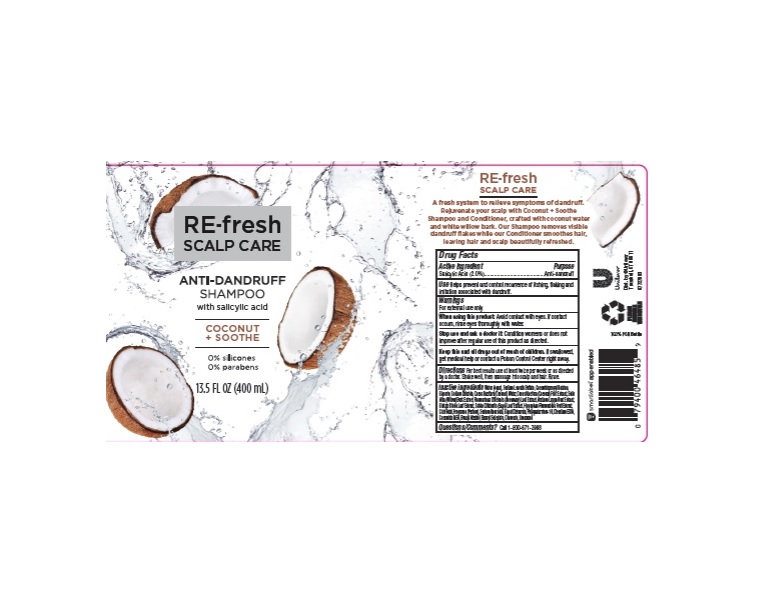Re-fresh Scalp Care | Salicylic Acid Shampoo while Breastfeeding

What is Re-fresh Scalp Care | Salicylic Acid Shampoo used for?
Brief: Anti-dandruff
I am currently breastfeeding and I want to know if using Re-fresh Scalp Care | Salicylic Acid Shampoo is safe for my kid? Does it have any effect on milk production?

Re-fresh Scalp Care | Salicylic Acid Shampoo Breastfeeding Analsys
Salicylic acid while Breastfeeding
SafeCAS Number: 69-72-7
It is topically used as a keratolytic, antiseptic, antifungal, dermatological and stomatological agent. At last update no published data on excretion into breast milk were found . Systemic absorption (distribution into the body) depends on the concentration of the product used and the duration of application. Absorption may reach 10 to 25% of the total amount applied on the skin. It is recommended not to use during lactation in large areas of skin or for prolonged periods. Available data on the elimination of Acetylsalicylic acid (Aspirin-ASA) in breast milk indicates it is clinically insignificant.No cases have been reported on Reye's syndrome by ASA through the breast milk which is considered very unlikely to occur with isolated and/or small doses used as antithrombotic treatments and anti-abortion measures, even less after application on the skin or topically in the mouth. Do not apply on the breast to prevent ingestion by the infant. If necessary, apply it after the feed and wipe it off thoroughly with water before the next feed.
Re-fresh Scalp Care | Salicylic Acid Shampoo Breastfeeding Analsys - 2
Salicylic acid while Breastfeeding
CAS Number: 69-72-7
No information is available on the clinical use of salicylic acid on the skin during breastfeeding. Because it is unlikely to be appreciably absorbed or appear in breastmilk, it is considered safe to use during breastfeeding.[1] Avoid application to areas of the body that might come in direct contact with the infant's skin or where the drug might be ingested by the infant via licking.
I am nursing mother and I have already used Re-fresh Scalp Care | Salicylic Acid Shampoo, what should I do?
Re-fresh Scalp Care | Salicylic Acid Shampoo is safe in breastfeeding and should not create any health problem for your baby but in case you feel any health issue associated with Re-fresh Scalp Care | Salicylic Acid Shampoo you should contact your doctor or health care provider. Be it pregnancy or lactation you shall keep your doctor informed.
My health care provider has asked me to use Re-fresh Scalp Care | Salicylic Acid Shampoo, what to do?
Definitely, Re-fresh Scalp Care | Salicylic Acid Shampoo is safe in lactation for baby. No wonder your doctor has recommended it.
If I am using Re-fresh Scalp Care | Salicylic Acid Shampoo, will my baby need extra monitoring?
No extra baby monitoring required while mother is using Re-fresh Scalp Care | Salicylic Acid Shampoo
Who can I talk to if I have questions about usage of Re-fresh Scalp Care | Salicylic Acid Shampoo in breastfeeding?
US
National Womens Health and Breastfeeding Helpline: 800-994-9662 (TDD 888-220-5446) 9 a.m. and 6 p.m. ET, Monday through Friday
UK
National Breastfeeding Helpline: 0300-100-0212 9.30am to 9.30pm, daily
Association of Breastfeeding Mothers: 0300-330-5453
La Leche League: 0345-120-2918
The Breastfeeding Network supporter line in Bengali and Sylheti: 0300-456-2421
National Childbirth Trust (NCT): 0300-330-0700
Australia
National Breastfeeding Helpline: 1800-686-268 24 hours a day, 7 days a week
Canada
Telehealth Ontario for breastfeeding: 1-866-797-0000 24 hours a day, 7 days a week
